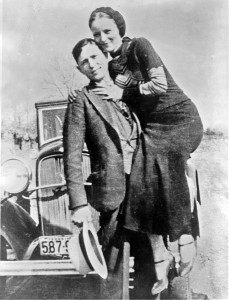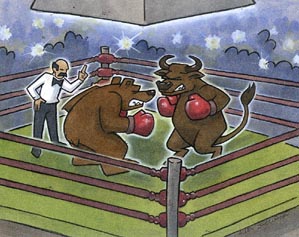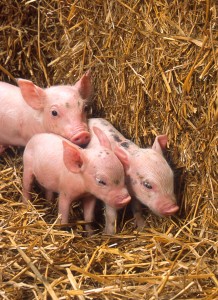
Notorious: The Rise of American Gangster Chic
Guest Manifesto by Alpha Dominance
Post Soundtrack: Wolves at the Door ~ Outlaw Bones
Audio Source: Wolves at the Door ~ Main Street Is Empty
You have to admit: American’s love their gangsters. Robin Hood, Billy the Kid, Bonnie & Clyde, Al Capone, “Lucky” Luciano, Snoop Dog and La Cosa Nostra all speak to some part of the American Ethos. We love the celebrity Outlaws and Gangster stories and follow their exploits with rapt attention. We emulate them with Gangster Chic. We celebrate this archetype in movies like The Godfather, Pulp Fiction, American Gangster and Natural Born Killers. Yet these individuals are criminals, murderers and all around not so admirable individuals, so why is this?
I believe it is an outgrowth of the rugged individualist ethic combined with our penchant for celebrity worship and the populist American Dream of the little guy making it big. Think about it for a moment. The Outlaw/Gangster is his own man. He bows to no authority and does for himself. His exploits make for great media copy and he become infamous thereby. He’s the natural bootstrapper, rising from ignominious origins to attain wealth and respect, albeit often by way of the gun. He’s unapologetic seeking the approval of no-one, yet he gets it in spades and when he goes out, he goes out big in a blaze of glory. He has a taste for the finer things in life and he’s going to get them by hook or by crook. He is the everyman with a dream writ large. He is the American Bad-Boy seasoned with the Hickory smoke of danger. We men all want to be him and the gals all want to do him. This den of thieves, of players and pimps, of hustlers and outlaws each personifies the darker side of American Alphas, and like the battered wife, we keep coming back for more.
This article describes three American archetypes, the Star, the Born-Again Sinner and the Gangster. I think it makes a good case:
Most interesting of all, however, is to speculate about what a contemporary version of Rourke’s book might include. If a Rourke of 2031 were to use popular culture to identify our most common archetypes, what would she find? First of all, I think, would be the Star, a type unknown in 1830 but absolutely central today. The Star is our secular, consumerist version of the Greek god: The pinnacle of aspiration and the focus of fantasy, he or she gets to enjoy what the rest of us only dream about. The Star—whether he is an actor or singer or sports figure—is not simply admired for what he is done; he is worshipped for who he is, gratuitously. The intensity of our worship and need also gives rise to the subcategory of the Fallen Star, from Marilyn Monroe to Kurt Cobain. The Fallen Star allows us to mix pity with our envy, reassuring us that, while we may dream of becoming one, the Star is best seen from a distance.
If the Star is the American triumphant, the Born-Again Sinner is the American repentant. The Sinner can be born again in the literal, Christian sense—this has been a common American experience ever since the 1820s, though Rourke only touches on religion in American Humor. But the posture of repentance, with the corresponding expectation of forgiveness, has transcended its evangelical origin, and today it shows up just about every time an American does something wrong. Bill Clinton’s lip-quivering apology for the Monica Lewinsky affair is the most famous recent example. On the other hand, Martha Stewart was widely blamed, after her conviction, for not giving a better performance as the Sinner—for failing to break down and ask forgiveness, as the archetype demands. Whether such contrition is genuine hardly matters; the archetype is so powerful that simply to act like a Born-Again Sinner is almost a guarantee of absolution.
Finally, there is the latest incarnation of an ancient American trope: the Gangster, whose ancestors are the backwoodsman, the cowboy, and the pirate. What defines him is not just his criminality or his violence, but the way he puts these things at the service of his own defiant moral code. The Gangster exalts personal loyalty and masculine power, in opposition to what he sees as an inhumane and hypocritical mainstream culture. Americans like to see the Gangster punished, in the end. But we want him to be killed, not imprisoned—his ending should be as outsized as his life. The Star, the Born-Again Sinner, and the Gangster account for a great deal of today’s American culture. But they are notably less comic than the archetypes Rourke found in our national psyche; after 200 years, perhaps America’s youthful high spirits have turned into something darker and more resigned.
The author also recognizes that the Outlaw/Gangster exudes masculinity. Power, danger, wealth, intrigue, loyalty, competence, intelligence, charisma and individually-determined morality: these are the traits that make men great. Interestingly these masculine traits naturally occured in Sicilian immigrants due to their unique history:
Just as the founders of our nation united to throw off the oppression of a parent government, the original Mafia was formed in medieval Italy and Sicily by peasant groups, “families” whose efforts were aimed at subverting the despotic and repressive rule of the Bourbon regime’s overlords, corrupt politicians, and land barons. Their code of ‘Omerta’ signified “manliness,” which included non-cooperation with authorities, self control in the face of adversity, and the vendetta in which any offense or slight to family must be avenged, no matter what the consequences or how long (it might take to avenge the victim)”
Frank Richard Prassel details the American penchant for the Outlaw in his book “The Great American Outlaw” as follows:
Deep within American folklore rides a mysterious and significant figure. He comes to us through mists of fact and fiction, an incarnate mixture of right and wrong. On the one hand, this ever-changing image represents crime, violence, and fear. On the other, it represents fearlessness, independence, and dedication. The figure poses a number of contradictions, including the true meanings of justice and freedom. Surrounded by legend, the outlaw endures as an enigma in our heritage
Click Here for The Great American Outlaw: A Legacy of Fact and Fiction
Like a moth to a flame we both love and hate the power and independence that defines a man’s man. As men in America have lost much of their former independence and so many have succumbed to the civilizing influence of PC culture, his Outlaw nature has been subsumed by a material culture where the affectation of hardness and steely resolve has supplanted action in at least suburban America. The decline of man has left a void in young men everywhere and given rise to the widespread acceptance of street culture and music, safely filtered through the corporate apparatus: the rise of the pretender. Lacking any expression of their own masculinity, legion angst ridden youth have co-opted street culture with the aid of their corporate handlers, mindlessly aping what they see on MTV. An industry rose up to satisfy this new need with expensive sneakers and jerseys becoming the haberdashery of choice and Gangster Chic was born.
This attire however is based on the corporate logo-splashed bastardized version of the Original Gangster Chic. Look back to the real deal and you come to a startling realization. These men were men of refined tastes. No teenager gear for them, they indulged in the finest suits and Italian shoes as befits an adult man of means. So strong is this association that Pinstripe suits have been forever branded Gangster Pinstripes. These men knew that intimidation lies not in outrageous appearance, but ability and will. Their appearance was impeccable, and their substance enforced their will. They had no need for pretense and putting on costumes. They took themselves seriously and conveyed this in their dress. Nowhere in their ensemble could a logo be seen. Modern Gangsters, when they mature, also frequently assume more upscale attire, with Air Force Ones replaced by Gators. Pimp culture has always recognized the value of a sharp appearance. They are forged in the mean streets and have no need to pretend at being bad-asses. The confidence rolls off of them in waves and like the heat shimmer on hot pavement; it is almost visible.
Being sharply dressed and well-groomed will take your game to an entirely new level as the indubitable G-Manifesto has maintained here. Building the internal confidence to handle your business no matter what will make you into more than a stuffed suit. Remember the traits that make the Outlaw and the Gangster unforgettable: Power, danger, wealth, intrigue, loyalty, competence, intelligence, charisma and individually-determined morality. Cultivate these in your life and integrate them into your being. They will serve you well. Become genuinely Gangster Chic.
Alpha Dominance ~ The Outlaw’s Son
Click Here to Read more by Alpha Dominance








